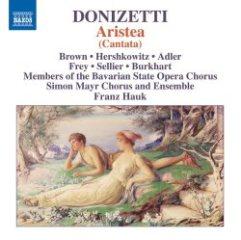Gaetano Donizetti – Aristea (2014)
Gaetano Donizetti – Aristea (2014)

1. Sinfonia 00:06:26 2. Introduzione: Seconda i nostri voti (Chorus, Corinna) 00:04:17 3. Recitativo: Amar che giova (Corinna, Cloe, Filinto) 00:03:20 4. Duetto: La bell'alma che nel petto (Filinto, Cloe) 00:09:08 5. Coro: Qui tenera e fida 00:01:58 6. Recitativo: Signor, dopo tant'anni (Comone, Licisco) 00:02:30 7. Cavatina: Soffro il destino irato (Licisco) 00:05:44 8. Recitativo: Misero prence! (Comone, Corinna) 00:02:12 9. Recitativo: Empia! T'arresta (Comone, Cloe, Corinna, Filinto) 00:01:23 10. Quartetto: Taci iniquo; io non t'ascolto (Comone, Filinto, Cloe, Licisco) 00:05:25 11. Quartetto: Misero cor, non sai (Cloe, Filinto, Licisco, Comone) 00:02:02 12. Quartetto: Lungi dagli occhi miei! (Comone, Licisco, Filinto, Cloe) 00:04:19 13. Recitativo: Perche più dell'usato (Corinna, Licisco, Comone, Filinto, Erasto, Cloe) 00:05:27 14. Finale: Fra cosi cari oggetti (Cloe, Chorus, Comone, Filinto, Licisco) 00:04:56 Filinto, son of Comone – Sara Hershkowitz, Soprano Corinna, shepherdess, in love with Filinto – Caroline Adler, Soprano Licisco, Prince of Messenia – Cornel Frey, Tenor Erasto, shepherd, supposed father of Aristea – Robert Sellier, Tenor Comone, nobleman of Messenia – Andreas Burkhart, Bass Lisandro, infant son of Filinto and Aristea – Silent Rôle Chorus of Shepherds and Shepherdesses Concertmaster: Theona Gubba-Chkheidze Members of the Bavarian State Opera Chorus Simon Mayr Chorus and Ensemble Franz Hauk - conductor
Gaetano Donizetti’s ‘mini opera’ Aristea follows the 19th-century fashion for composing celebratory scenic works with a large cast and full orchestra, in this case to honour Ferdinand I, King of the Two Sicilies. Librettist Giovanni Schmidt recycled Aristea from an earlier abandoned opera set in idyllic Greek surroundings. This tells the classical story of enforced separation of a father from his daughter, their subsequent confusions and final happy reunion. Donizetti’s early style was influenced by Rossini but is nevertheless independent and innovative, often hinting at his later operatic masterpieces. ---naxos.com
Donizetti would never have expected Aristea to receive more than the two performances it had in 1823, and certainly not have expected it to be heard nearly two hundred years later. If he had been right the loss would have been ours, for although it is certainly not amongst his more important works, there is much very enjoyable music in Aristea.
It was written in honour of the name day of Ferdinand I, King of the Two Sicilies, but has a plot of which the composer had a low opinion, disliking its coldness. I am indebted for this and other historical information to the helpful booklet notes by Thomas Lindner. It is set in ancient Greece and concerns a noble father and daughter who are separated and then reunited. Much more than that I remain unclear about in the absence of a more detailed synopsis or a translation of the Italian libretto which is available on line from Naxos. The musical numbers consist of an Overture (reused from Zoraida di Granata), a duet for two sopranos, a tenor cavatina, a splendid multi-sectioned quartet and a Finale, the whole interspersed with choruses and string-accompanied recitatives. There is considerable variety of musical character and, even if none of the items could be counted amongst the composer’s best work, the general standard is high and, for me at least, dullness was kept at bay. Its relatively short duration helps in this.
The performance is thoroughly idiomatic and accomplished. There may be no obvious stars amongst the soloists but neither are there any weak links and all manage to cope with sometimes formidable challenges. The chorus and orchestra sing and play with evident enthusiasm and as far as I could tell without a score. Franz Hauk makes all he can of the music.
It is good that not only are there still Donizetti rarities to unearth but that what is revealed is so enjoyable. This is a disc that should be in the collection of any enthusiast for that composer’s music. ---John Sheppard, musicweb-international.com
download (mp3 @320 kbs):
yandex 4shared mega mediafire zalivalka cloudmailru uplea ge.tt








